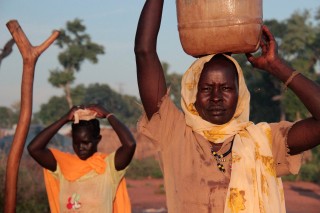Hassana, a 36-year-old rural Nigerian woman lives in a remote part of Nasarawa state, northern Nigeria, where clean water is a rare but essential commodity, so, she has to travel for miles everyday to get water from the community’s borehole plant for her household. Hassana’s case is a little bit better than Fatima who travels for miles to get cooking water from a local stream where she also does her laundry alongside other villagers, a situation that cannot be helped.
There are about 6 large drums in Hassana’s house, some reserved for bathing and toileting, while the others are used for cooking. In a house of 7, these trips for water need to be made every day. Sometimes, the mother of five gets the assistance she needs from three of her children, who also go out to hawk goods in order to make ends meet.
The above scenario is replicated all over Africa, where it is mostly women who suffer from the lack of water. Yes, their male counterparts suffer same but they do so behind the strong backs of their wives, sisters and mothers. In many an African household, the women’s chore is to fetch water either from the stream, well, bore-hole or river, men are hardly ever held to that stereotype. It is so bad that many pictures flooding the internet and pages of newspapers depicting water access on the continent, especially in the rural and urban slum areas, always feature a woman or women carrying heavy pails of water on their heads.
In Africa, women spend hours fetching water every day, barely having time for anything else, this is as a result of lack of amenities which provide clean water. For instance, in Nigeria, a report compiled by NOI Polls in 2013 revealed that more than half of the country’s population lack clean water, a narrative that is yet to improve as the government hardly ever provides the necessary measures to improve conditions as more people are setting up privately owned boreholes to provide for themselves.

Already, there are uncountable pictures and statements floating around the internet celebrating #WorldWaterDay. Activists and, indeed, the entire world are pledging unflinching support for the cause to spread awareness on the lack of water in several regions around the world as well as ways we can all help by saving water resources. That’s all good but what happens after today, more specifically, how will the men decide to contribute to this conversation, trying to save the women in their lives the stress of having to fetch water for several hours or walk for miles on end?
Many have commented in support of this behaviour, stating that it is a part of African culture for a woman to go in search of ‘clean’ water and balance a pail of water on her head while providing water for her family, if it is not readily available in her community. In 2014, the United Nations called attention to the reality African women are faced with, to provide water for their families where the basic necessity is desperately lacking. This is where gender equality comes to play, as stakeholders in our communities, we need to dissuade this prevalent behaviour, so our future girl children do not get stuck in this rut, where our mothers have been for centuries, without any benefits.
It is high time we started focusing on specific goals to tackle water challenges, not just conserving natural resources to save water. Women need to be saved too.








